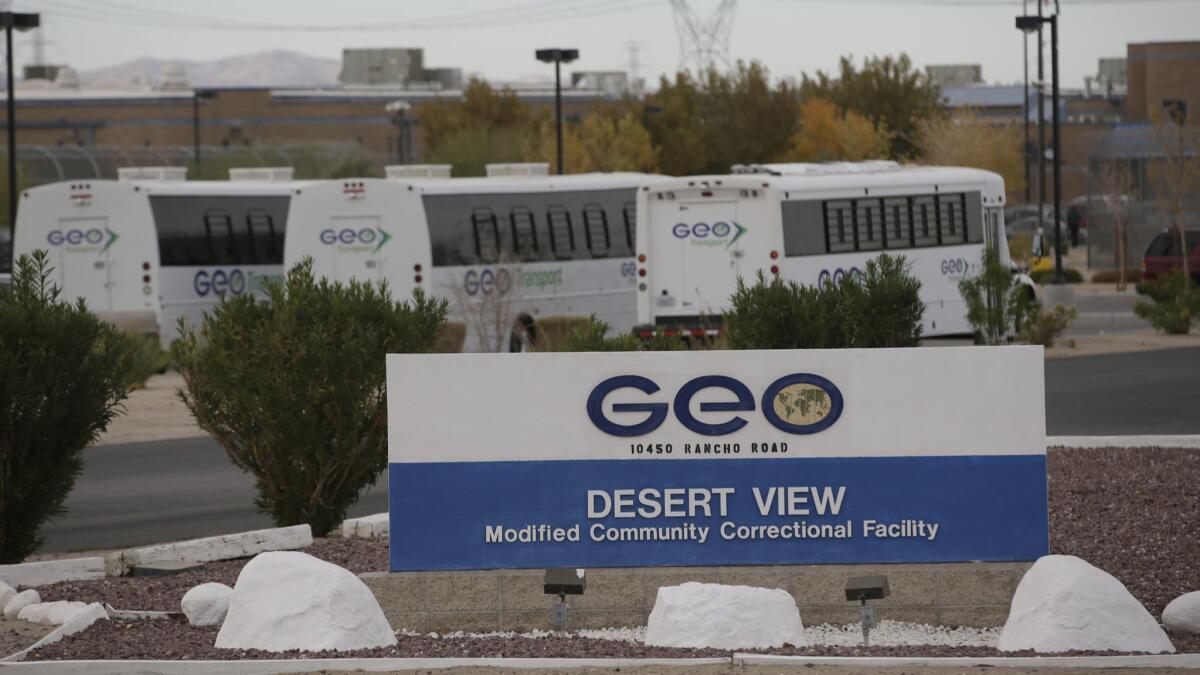Op-Ed: Private prisons are archaic and cruel. California needs to stop using them

- Share via
As we contemplate ways to address the disproportionate number of people imprisoned in America, one potential impediment to change is the large corporations that profit from incarceration.
Between 2000 and 2016, the number of people housed in private prisons in the United States increased by 47% compared with an overall rise in the prison population of 9%, according to an analysis from the Sentencing Project.
Before the genesis of the war on drugs in the 1980s, America rarely used private prisons.
But after the implementation of draconian mandatory sentences during the Reagan administration, incarceration rates jumped, and private corporations rushed in to fill the need for more prison cells in a hurry.
Corporate executives and shareholders should not profit from putting people in cages.
The system that has developed is completely counter to our values, particularly in a state as progressive as California. We should not be part of a prison system in which there is a profit incentive to lock up more people.
There is now an effort in the state legislature to ban this backward and immoral practice in California. AB 32, which is gaining broad support from legislators and the governor, provides a common-sense solution that would ban new contracting out of incarceration to private prison companies starting in 2020 and sets an end date of 2028 for the removal of all state inmates from private prisons.
California currently contracts with two of the largest firms in the private-prison industry, GEO Group and CoreCivic (formerly Corrections Corp. of America), both of which have faced numerous lawsuits over the years accusing them of substandard medical care and treatment of inmates.
CEOs and shareholders of private prison companies have an incentive to minimize investments and maximize profits for shareholders, which can result in cutting corners to lower operating costs, including worse treatment of inmates and worse pay for prison guards.
A 2016 report from the Justice Department found that private prisons regularly failed to ensure inmates were receiving medical care. They reported more than twice as many inmate-on-staff assaults as in state-run prisons, and reported a 28% higher rate of inmate-on-inmate assaults. At La Palma Correctional Center, a private prison in Arizona that holds California inmates and Immigration and Customs Enforcement detainees, a 2010 state inspector general report discovered that the facility overused solitary confinement, provided insufficient services and had numerous security issues.
And although the contracting out of detention was done in part to save money, recent research has cast doubt on whether private prisons actually save the government money.
An investigation into the prisons in Arizona discovered that inmates in the state’s private prisons rarely cost less than those in state-run prisons, and in some cases cost as much as $1,600 more per inmate per year. The report also noted that private prisons can push down costs by refusing to take prisoners with severe illnesses or a history of violence, something state-run prisons can’t do.
GEO Group and CoreCivic are also key partners in President Trump’s inhumane immigration agenda, as both operate detention centers throughout the country.
Our state is unfortunately one of the top revenue-producing states for both companies, and state lawmakers should do everything they can to divorce California from this toxic relationship.
Enter the Fray: First takes on the news of the minute »
That shouldn’t be terribly difficult. California uses only five private facilities to house inmates. Together, the prisons incarcerate only about 3.5% of the state’s total prison population, half of them in state and half in Arizona.
Transferring those inmates to other prisons and not sending new ones is entirely feasible within the time frame outlined in AB 32, particularly given the precipitous decline in California’s prison population since a federal court ordered officials in 2009 to reduce dangerous and inhumane prison overcrowding.
While the expansion of private prisons is not the only problem in California’s often slow-moving criminal justice system, there is something particularly galling about people making money off of increasing the size of our prison population.
Corporate executives and shareholders should not profit from putting people in cages, and it’s time to end the archaic and cruel practice of private prisons in California.
Jackie Lacey is the Los Angeles County district attorney.
More to Read
A cure for the common opinion
Get thought-provoking perspectives with our weekly newsletter.
You may occasionally receive promotional content from the Los Angeles Times.









